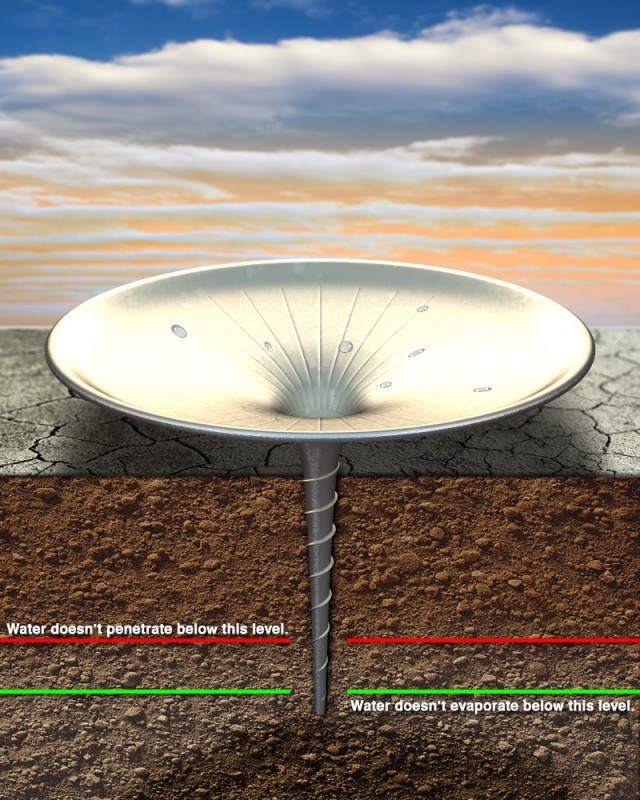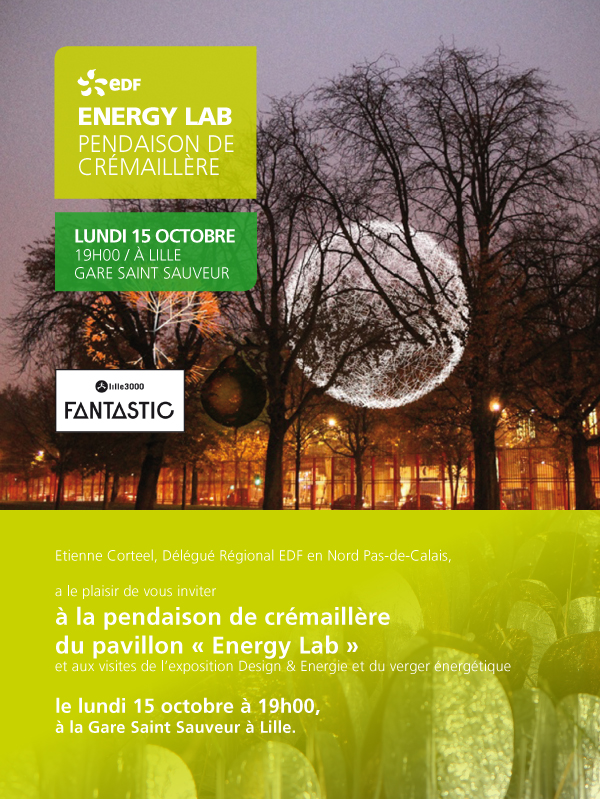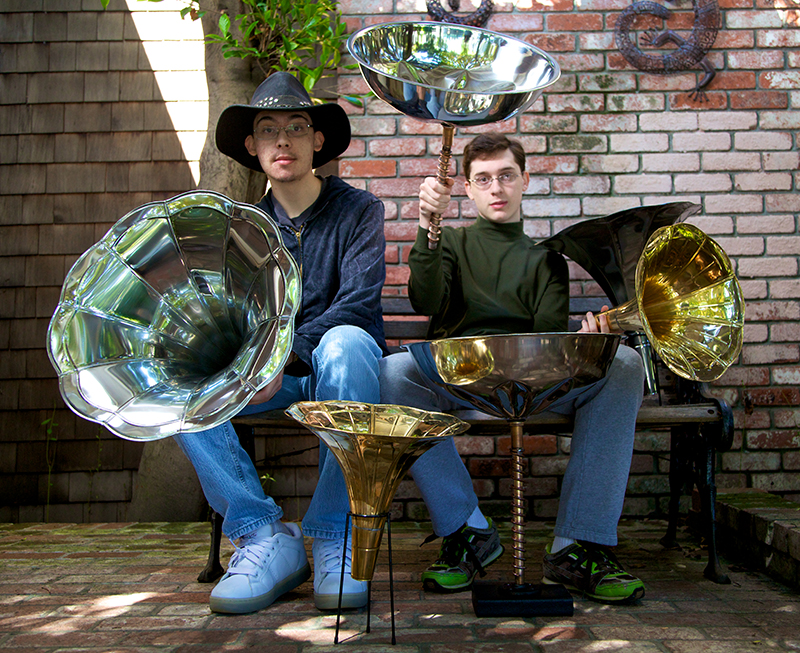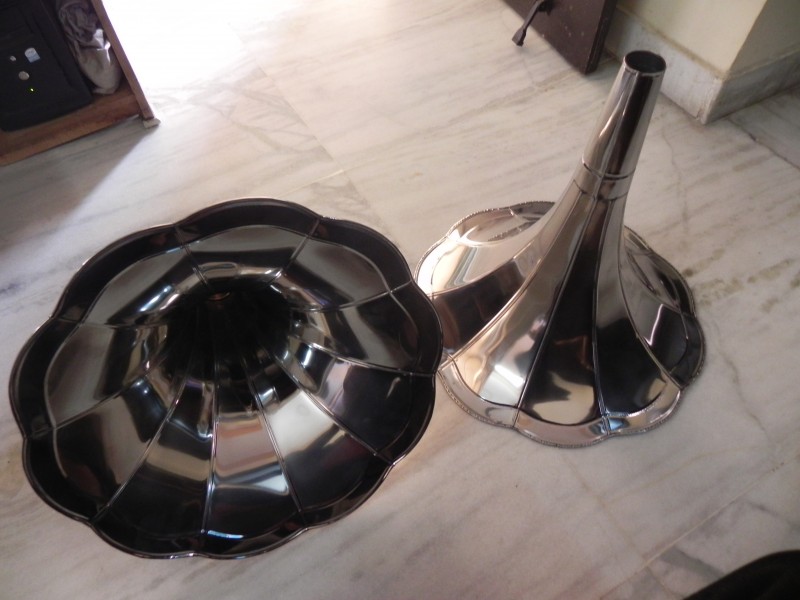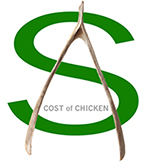The D.R.I.P.S. Project
D.R.I.P.S. is one the eight winners of the 2011 EDF Sustainable Design Challenge!
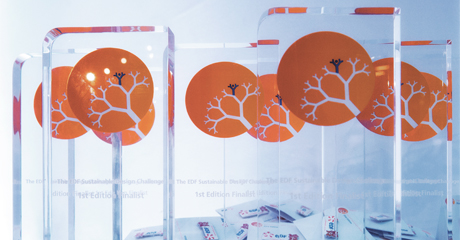
Idea
A cheap plastic or metal conical funnel, about the diameter of a large dinner plate, collects dew and delivers water below the evaporation layer for deep root irrigation in arid environments.
Problem
In an arid environment, where there is a large temperature difference between the day and the night, dew forms. But this precious moisture evaporates during the day before it reaches the roots of thirsty plants. If there was a way to transport that water directly to the roots before it evaporates, many plants would thrive in an otherwise barren landscape. We came up with the Deep Root Irrigation Precipitation System (D.R.I.P.S. for short) to help solve this problem.
Most plants and animals living in a desert environment evolved to take advantage of dew—in many cases their sole water source. D.R.I.P.S. would allow people living in desert conditions to plant food they couldn’t grow without irrigation, thus improving nutrition. The water which would otherwise evaporate is preserved as moisture below the surface.
Solution
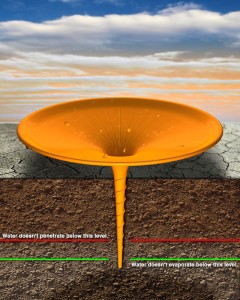 The Deep Root Irrigation Precipitation System (D.R.I.P.S. for short) is a funnel that channels water droplets from the surface to below the evaporation level, about 1.5 feet (.5 meter) down. As to the form, imagine one of those diagrams of a black hole making a gravity well on a rubber sheet. The D.R.I.P.S. cones would look like that—shallow and broad at the top, about 15 inches (40 cms.), with a thin funnel part that extends about 2 feet (.5 meter). Thin spiral threads projected from the thin part enable the cone to be screwed and anchored into hard soil. D.R.I.P.S. collects the droplets of water on the broad surface of the cone and channels it down the central tube, deep below the surface where it can’t evaporate. Small channels embossed on the plastic surface of the cone draw the water down by capillary action. The D.R.I.P.S. cones are easy and cheap to manufacture from recycled plastic or aluminum (plastic version is shown on the left; metal version is shown on top), easy to use (just screw into the ground next to a plant), and they serve to deliver precious water to plants with no further human intervention or energy usage. The whole cone is one piece with no moving parts and they are designed to be stackable for shipping and storage.
The Deep Root Irrigation Precipitation System (D.R.I.P.S. for short) is a funnel that channels water droplets from the surface to below the evaporation level, about 1.5 feet (.5 meter) down. As to the form, imagine one of those diagrams of a black hole making a gravity well on a rubber sheet. The D.R.I.P.S. cones would look like that—shallow and broad at the top, about 15 inches (40 cms.), with a thin funnel part that extends about 2 feet (.5 meter). Thin spiral threads projected from the thin part enable the cone to be screwed and anchored into hard soil. D.R.I.P.S. collects the droplets of water on the broad surface of the cone and channels it down the central tube, deep below the surface where it can’t evaporate. Small channels embossed on the plastic surface of the cone draw the water down by capillary action. The D.R.I.P.S. cones are easy and cheap to manufacture from recycled plastic or aluminum (plastic version is shown on the left; metal version is shown on top), easy to use (just screw into the ground next to a plant), and they serve to deliver precious water to plants with no further human intervention or energy usage. The whole cone is one piece with no moving parts and they are designed to be stackable for shipping and storage.
Advantage
Most plants and animals living in a desert environment evolved to take advantage of dew—in many cases their sole water source. D.R.I.P.S. would allow people living in desert conditions to plant food they couldn’t grow without irrigation, thus improving nutrition. The water which would otherwise evaporate is preserved as moisture below the surface.
We believe D.R.I.P.S. would help poor subsistence farmers living in the deserts of North Africa. These people have difficulty growing food due to a lack of water. D.R.I.P.S. could change that and allow more nutritious plants to grow in areas where it was not possible before. Soon after a prototype is built, D.R.I.P.S. should be easy to mass-produce and cost pennies to make. With no moving parts or complicated technology, D.R.I.P.S. would just work.
EDF Sustainable Design Challenge
We have submitted our D.R.I.P.S. project to EDF Sustainable Design Challenge. Here’s a lower rez PDF of our submission: “DRIPS Project Presentation for the EDF Design Challenge, June 2011.”

